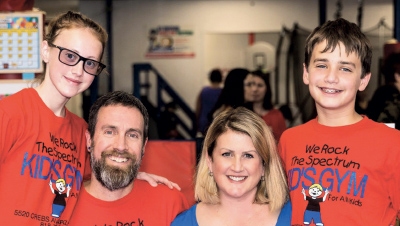
Franchise concepts focus services on special needs
May 20, 2020 | In:

It was in 2009 that Gabriel, Dina Kimmel’s son, was diagnosed with moderate to severe autism spectrum disorder. Kimmel remembers the time well as her family could hardly visit any playgrounds without being asked to leave. After the fifth such experience, she was fed up and decided to create a private gym in her bedroom—one that both Gabriel and her neurotypical daughter, Sophia, could play in.
That first gym was no ordinary one. Kimmel consulted with a range of applied behavior analysis, or ABA, physical, occupational and speech therapists to set up the right equipment and address the sensory disorder challenges Gabriel faced.
In 2010, Kimmel formalized the concept with a location in Tarzana, California, and six years ago launched franchising. We Rock the Spectrum has since expanded to more than 70 global locations.
Franchisees who do qualify train to become registered behavior technicians, which is a form of ABA therapy, and understand how to work with all children. Calls from corporate at least once a week lend support or offer ideas for enrollment in camps and other We Rock the Spectrum offerings. Regional training facilities also share ideas, Kimmel says.
Successful gym owners who stand out as representatives in their community spearhead these regional facilities and add an additional layer of support.
The company helps franchisees “sell the product because even though this is a niche we occupy, you need to know how to talk about it,” Kimmel says.
As We Rock the Spectrum calibrates its expansion plans, Kimmel is determined to pay it forward. “I feel like I’m a soldier at war. I want to help as many families as I can,” she recalls telling her husband when they started franchising. Gabriel is now 13 and loves helping other children at the gym.
One lesson Kimmel learned quickly: how to identify the right franchisee fit. An ideal owner identifies with the needs of kids with autism spectrum disorder, either because of a child in the family or because of professional training. “One of the biggest challenges, in the beginning, was identifying who was going to make a great gym owner and who’s going to represent the brand mission well, and our focus on inclusion,” Kimmel says.
The focus on inclusion—“the spectrum is all kids,” Kimmel says—carries through to the franchise’s nonprofit foundation, My Brother Rocks the Spectrum. The foundation ensures all kids with special needs and their families, no matter the income level, can access the gym.
A new driver for We Rock the Spectrum is “play with a purpose,” which extends not only to intentional exercise and stimulation of the senses but also in making play and work communities more inclusive of families so siblings can play together and communities can work together, Kimmel says.
“Not all kids are the same, they are all different but they all share a universal language of fun and that is what our equipment provides for all children,” Kimmel says.
Read more from this article at Franchise Times.